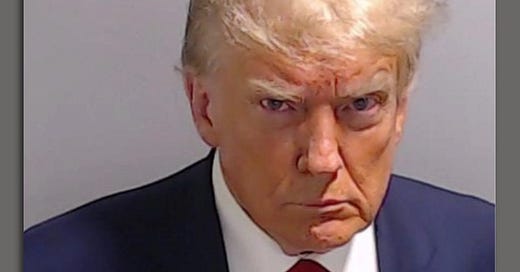I have not been covering the run-up to the presidential primaries and will not be covering them much in the future. As I explained before, I regard them as a foregone conclusion for both parties, so there’s no point pretending there’s a contest.
But I think it’s worth checking in on the primaries briefly after the first two contests, both to say, “I told you so,” and as a springboard for a wider political phenomenon that is worth talking about: the transformation of the Republican Party into the final stage of Trumpism.
What Biden Needs to Do to Win
That the incumbent president is sailing easily toward the Democratic Party’s nomination is to be expected. Yes, Biden is not a terribly popular president and faces serious grumbling from parts of the congenitally fractious Democratic coalition. (Remember the famous quip from Will Rogers: “I am not a member of any organized political party. I’m a Democrat.”) But to replace him would open up even more divisions, and there is no successor who would clearly be more popular.
Besides, parties don’t usually deny their incumbent the nomination; it hasn’t happened since Franklin Pierce in 1852. It seems too much like an admission of failure. So Democrats will grit their teeth and go with Joe because he’s better than the alternatives, which is pretty much his campaign slogan for this year.
If you don’t think that’s a compelling basis for a campaign, think again. The primary results already imply that Biden might be stronger than his low popularity ratings would indicate. In New Hampshire, for example, he sailed to an overwhelming victory without even being on the ballot. Biden and the Democratic Party leadership are in a long-running feud with Iowa and New Hampshire, which they are trying to push back from their first-in-the-nation status in favor of South Carolina, which is more racially diverse and thus, the Democrats argue, more representative of the rest of the country. So Biden wasn’t even put on the ballot in New Hampshire, yet he still got as many as 75,000 write-in votes to win handily over a couple of no-name challengers.
Meanwhile, on the Republican side, Nikki Haley performed relatively well against Donald Trump, but mostly on the strength of Democrats crossing over into the Republican primary to vote for her. What this implies is that there are a lot of people who are not wild about Joe Biden but don’t hate him enough to vote for the other side—but there are a lot of people who hate Donald Trump enough to vote for whoever is running against him.
This is the time of year when people will start publishing a lot of stories with headlines like “What Biden Needs to Do to Win.” He doesn’t need to do anything. He just needs to stay alive and remain reasonably coherent and not be Donald Trump. He will not win because people love him. If he wins, it will be because people hate the other guy.
And Donald Trump—along with the party he represents—hates them right back. That’s the lesson that is emerging from the early primaries.
There Go the People, I Must Follow Them
But first a note about Nikki Haley.
Keep reading with a 7-day free trial
Subscribe to The Tracinski Letter to keep reading this post and get 7 days of free access to the full post archives.




